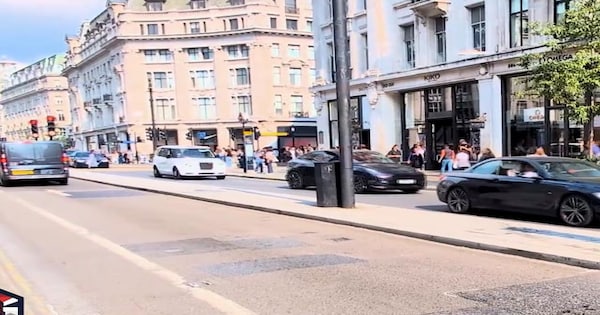What are some benefits of the traffic ban for the local economy?
The Impact of London Mayor’s Traffic Ban on Oxford Street on the British Economy
If you’ve been to London, the chances are that you’ve strolled down Oxford Street, one of the busiest shopping districts in the city. However, in recent years, the London Mayor has implemented a traffic ban on parts of Oxford Street, aiming to reduce congestion and improve air quality.
The Traffic Ban
The traffic ban, introduced by the London Mayor, has prohibited all vehicles from entering the busiest section of Oxford Street, from Orchard Street to Oxford Circus. This move aimed to create a more pedestrian-friendly environment and reduce pollution, making it safer and more enjoyable for shoppers and tourists. However, this initiative has sparked significant debates and concerns, especially among businesses and residents.
Challenges for Businesses
The traffic ban has posed several challenges for businesses on Oxford Street, and its surrounding areas, particularly in terms of revenue and foot traffic. Here are some of the key difficulties faced by businesses:
- Decreased foot traffic: With the restriction of vehicles, some businesses have reported a decrease in foot traffic on Oxford Street, which has had a direct impact on their sales and overall revenue.
- Delivery and logistics: The traffic ban has also presented logistical hurdles for businesses, especially with regards to deliveries and merchandise transportation. This has led to potential delays and increased costs for businesses.
- Diversity of customers: The ban has affected the diversity of customers who can access the shopping district, potentially alienating those who rely on vehicles for mobility, such as the elderly and individuals with disabilities.
Benefits and Practical Tips
While the traffic ban has presented challenges, it has also brought about several benefits, which can be advantageous for the local economy. Here are some practical tips for businesses to navigate through these changes:
- Embracing online presence: Businesses should consider enhancing their online presence and e-commerce capabilities to reach a wider customer base, beyond those who can physically access the brick-and-mortar stores.
- Investing in alternative transportation: Implementing alternative transportation options, such as bicycle delivery services and electric vehicle fleets, can help mitigate the challenges posed by the traffic ban.
- Engaging with the community: Building a strong and engaged local community can help businesses attract and retain customers, despite the changes in traffic patterns on Oxford Street.
Case Studies
Several businesses have adapted to the traffic ban and have seen positive outcomes. For instance, a local boutique on Oxford Street introduced a bicycle delivery service, allowing them to reach customers in the area swiftly, while reducing their carbon footprint. This initiative not only provided a convenient delivery option to customers but also generated positive PR for the business.
The Economic Landscape
Despite the challenges posed by the traffic ban, there have been positive impacts on the broader economic landscape of the country. The reduction of vehicular traffic has contributed to a decrease in air pollution and carbon emissions, creating a healthier and more sustainable environment for businesses and residents alike.
Additionally, the pedestrian-friendly initiative has attracted tourists and shoppers who appreciate the safer and cleaner environment, potentially bolstering the tourism industry and driving economic growth in the long run.
Conclusion
While the traffic ban on Oxford Street has certainly brought about challenges for businesses, it has also opened up new opportunities for innovation and sustainability. By embracing these changes and strategizing for the future, businesses can thrive in the evolving economic landscape, contributing to a greener, healthier, and more prosperous British economy.
The British Indian Community in London: Implications of the Oxford Street Traffic Ban
London, the most popular city in the United Kingdom, attracts over half a million visitors daily for various activities such as shopping, dining, and entertainment. Recently, London Mayor Sadiq Khan declared plans to prohibit traffic on Oxford Street. This decision has raised concerns about its impact on the economy, local shops, and residents.
Implications for Local Businesses
With the ban on traffic at Oxford Street, businesses in the area are bracing for significant changes. The transition may lead to decreased foot traffic initially, posing potential challenges for retailers and eateries. However, studies have shown that pedestrian-friendly areas can attract more visitors and enhance business opportunities in the long run.
Effect on Residents
The ban is also expected to affect local residents who rely on public transportation to commute through Oxford Street. With alternative routes being evaluated by city officials, it is important to consider how this decision will impact everyday life for those living nearby.
Community Perspectives
For members of the British Indian community residing around Oxford Street, this announcement raises several questions about how they navigate through their neighborhood. It is crucial to understand their experiences and insights regarding potential changes brought about by this initiative.
Future Outlook
As London continues its efforts towards sustainable urban development and improved air quality standards with initiatives like banning traffic on major streets like Oxford street; adapting to these changes will be essential for both businesses and residents alike.
As one of Europe’s most vibrant cities striving towards a greener future; London’s decision regarding traffic control reflects its commitment towards creating a healthier environment.
While there are concerns surrounding Sadiq Khan’s announcement to ban traffic on Oxford Street; it is evident that this bold move aligns with broader environmental goals aimed at promoting cleaner air quality within London City’s bustling heart.
By acknowledging concerns from various perspectives including those from British India residing nearby , we can work towards establishing solutions beneficial for all parties involved.


